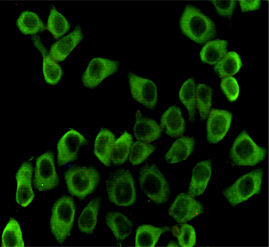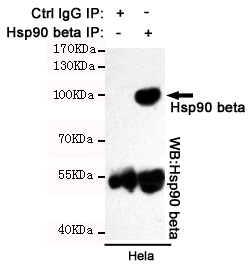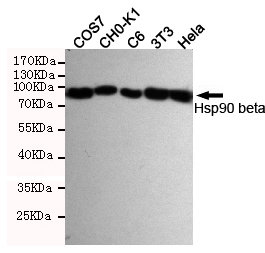-
Product Name
Anti-Hsp90 beta (3B9) Mouse antibody
- Documents
-
Description
Hsp90 beta (3B9) Mouse monoclonal antibody
-
Tested applications
WB, ICC/IF, IP
-
Species reactivity
Human, Mouse, Rat, Monkey, Hamster
-
Alternative names
HSP90AB1;90 kda heat shock protein beta HSP90 beta;D6S182;FLJ26984;Heat shock 84 kDa;Heat shock 90kD protein 1 antibody; beta;Heat shock 90kDa protein 1 beta;Heat shock protein 90kDa alpha (cytosolic) class B member 1;Heat shock protein beta;Heat shock protein HSP antibody
-
Isotype
Mouse IgG1
-
Preparation
Antigen: Purified recombinant human Hsp90 beta protein fragments expressed in E.coli
-
Clonality
Monoclonal
-
Formulation
Purified mouse monoclonal in PBS(pH 7.4) containing with 0.02% sodium azide and 50% glycerol.
-
Storage instructions
Store at 4°C short term. Store at -20°C long term. Avoid freeze / thaw cycle.
-
Applications
WB: 1/2000
;ICC: 1/200
-
Validations

Immunocytochemistry staining of HeLa cells fixed with 4% Paraformaldehyde and using anti-Hsp90 beta mouse mAb (dilution 1:200).

Immunoprecipitation analysis of Hela cell lysates using Hsp90 beta mouse mAb.

Western blot detection of Hsp90 beta in Hela,3T3,C6,CHO-K1 and COS7 cell lysates using Hsp90 beta mouse mAb (1:2000 diluted).Exposion time: 4min.Predicted band size:90KDa.Observed band size:90KDa.
-
Background
Swiss-Prot Acc.P08238.Molecular chaperone that promotes the maturation, structural maintenance and proper regulation of specific target proteins involved for instance in cell cycle control and signal transduction.Undergoes a functional cycle that is linked to its ATPase activity.This cycle probably induces conformational changes in the client proteins,thereby causing their activation. Interacts dynamically with various co-chaperones that modulate its substrate recognition,ATPase cycle and chaperone function.
Related Products / Services
Please note: All products are "FOR RESEARCH USE ONLY AND ARE NOT INTENDED FOR DIAGNOSTIC OR THERAPEUTIC USE"
